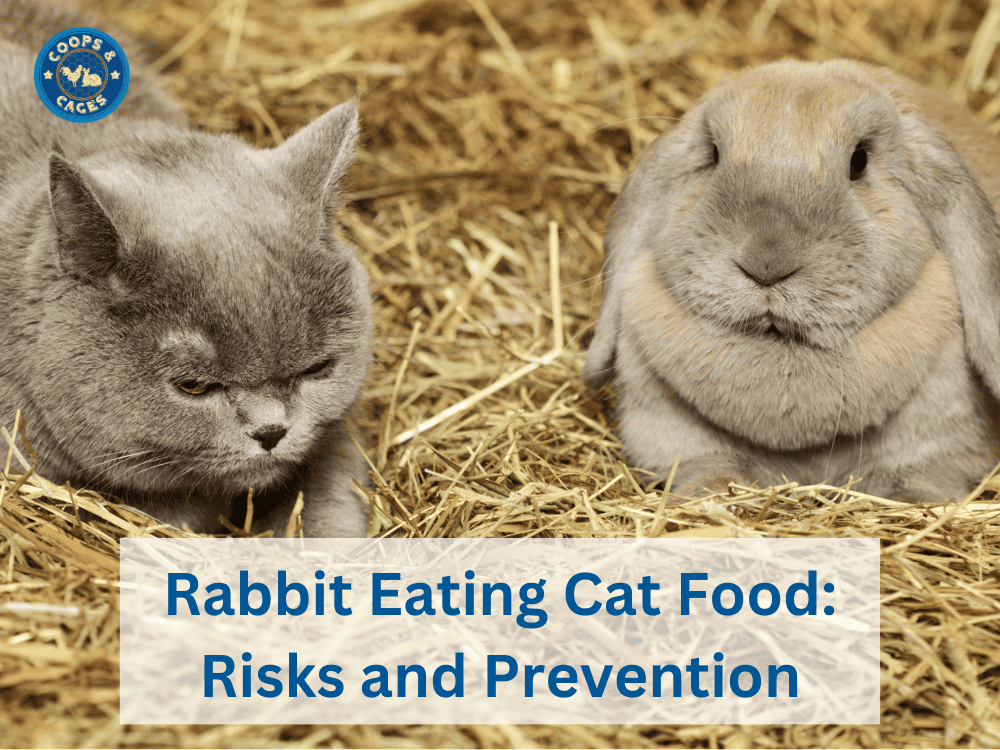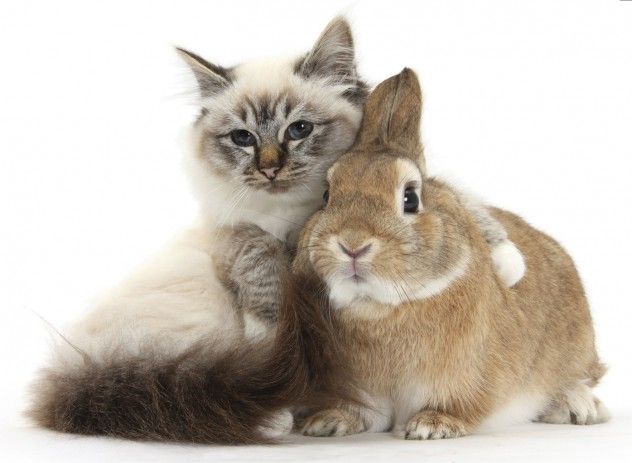No, rabbits should not eat cat food. Their dietary needs are different.
Rabbits require a diet high in fiber and low in protein, while cat food is high in protein and fats. Understanding what to feed your rabbit is crucial for its health. Rabbits have a unique digestive system that thrives on a diet of hay, fresh vegetables, and specialized pellets.
Feeding them foods designed for other animals, like cat food, can cause serious health issues. Cat food lacks the necessary fiber that rabbits need and contains too much protein and fat, which can lead to obesity and digestive problems. In this blog post, we will explore why cat food is unsuitable for rabbits and provide tips on proper rabbit nutrition to ensure your furry friend stays healthy and happy.
Contents
Introduction To Rabbit Diet
Rabbits need a diet high in fiber. It helps their digestion. They also need low fat. Their diet should include hay, fresh vegetables, and water. Hay is the most important. It keeps their teeth healthy. Fresh vegetables provide vitamins. Avoid high sugar foods.
Common foods for rabbits include Timothy hay, leafy greens, and small pellets. They love carrots, but only in small amounts. Apples are fine too, just not too much. Fresh water is crucial every day. Always check their food for freshness. Avoid wilted or old vegetables.

Credit: www.coopsandcages.com.au
What Is Cat Food Made Of?
Cat food has many ingredients. The main ones are meat and fish. Cats need protein. Other ingredients include grains, vegetables, and vitamins. Some cat food has preservatives. These keep the food fresh. Some brands use artificial colors. Others use natural ones.
Cat food is rich in protein. Cats need this to stay healthy. It also has fats. These give cats energy. Cat food has vitamins and minerals. These help with growth. Some cat food has fiber. This aids digestion. Cats also need amino acids. One important one is taurine.
Why Cat Food Is Unsafe For Rabbits
Cat food has too much protein for rabbits. Rabbits need low protein to stay healthy. High protein can hurt their kidneys. It can make them sick. Always choose rabbit-specific food.
Cat food has high fat. Rabbits need low fat. Too much fat can cause obesity. Obesity leads to many health issues. It affects their liver and heart. Keep your rabbit’s diet low in fat.
Cat food contains animal by-products. Rabbits are herbivores. They should eat plants. Animal by-products can cause digestive problems. It can make them very ill. Always feed them plant-based food.

Credit: rabbits.life
Health Risks For Rabbits
Rabbits have sensitive stomachs. Cat food can cause digestive problems. It has high protein and fat. Rabbits need more fiber. Cat food can lead to diarrhea. It can also cause stomach pain.
Cat food is very rich. It can make rabbits gain weight fast. Rabbits need a balanced diet. Too much fat can cause obesity. Obese rabbits have trouble moving. They can also have other health problems.
Some cat food ingredients can be toxic. Rabbits should not eat these foods. Certain vitamins and minerals can harm them. Too much protein is also dangerous. It can hurt their liver and kidneys.
Signs Your Rabbit Ate Cat Food
Stomach upset is common. Your rabbit may have diarrhea. Another sign is loss of appetite. Your pet may feel weak. Bloating and gas can occur. Refusal to drink water is also a warning. Excessive drooling might happen. Lethargy is a clear sign. Odd behavior can be noticeable.
Remove the cat food right away. Check your rabbit for symptoms. Give fresh hay and water. Keep an eye on your pet. Call the vet if symptoms get worse. Do not wait if your rabbit looks very sick. Follow vet’s advice closely. Monitor your rabbit for the next few days.

Credit: www.reddit.com
Safe Alternatives To Cat Food
Rabbits need special food. Rabbit pellets are good for them. They give the right nutrients. They help rabbits grow well. Pellets are easy to find in pet stores.
Rabbits love fresh food. Carrots, lettuce, and apples are great. Do not give too much. It can upset their tummy. Small amounts are best.
You can make treats at home. Mix oats, banana, and a bit of honey. Shape into small balls. Bake them until firm. Your rabbit will enjoy them.
Preventing Access To Cat Food
Store cat food in a high, closed cabinet. Use airtight containers to keep the food fresh. Rabbits are curious and may find their way to open bags. Keeping food sealed prevents this. Label containers to avoid confusion. Proper storage also keeps food free from pests.
Feed your pets in different rooms. This ensures they eat their own food. Create a feeding schedule for each pet. Rabbits and cats need different nutrients. Separate feeding areas help meet their needs. Monitor feeding times to make sure they don’t switch places.
Consulting A Veterinarian
Rabbits have very different dietary needs than cats. Cat food can harm them. If your rabbit eats cat food, call a vet. They can check for any health issues. Watch for signs like changes in poop. Another sign is if your rabbit seems tired or stops eating. These are emergency signs and need quick help.
Rabbits need a diet of mostly hay. Fresh vegetables are good too. Avoid giving them grains and high-sugar foods. Always provide fresh water. Good food keeps them healthy and happy. Ask your vet for specific diet plans. They can help you choose the best foods.
Frequently Asked Questions
Can Rabbits Safely Eat Cat Food?
No, rabbits should not eat cat food. Cat food is high in protein and fat, which is unsuitable for rabbits’ digestive systems.
What Happens If A Rabbit Eats Cat Food?
If a rabbit eats cat food, it may suffer from digestive issues, obesity, and potential liver damage due to high protein and fat content.
Is Cat Food Toxic To Rabbits?
While not immediately toxic, cat food is harmful to rabbits over time. It can lead to serious health issues due to its inappropriate nutritional composition.
What Should Rabbits Eat Instead?
Rabbits should primarily eat hay, fresh vegetables, and a small amount of high-fiber pellets. This diet supports their digestive health and overall well-being.
Conclusion
Rabbits should not eat cat food. Cat food lacks essential nutrients for rabbits. It can cause serious health problems. Feed your rabbit a balanced diet. Include hay, fresh vegetables, and rabbit pellets. This ensures they stay healthy and happy. Always consult a vet for diet advice.
Proper nutrition is key to your rabbit’s well-being. Keep their diet natural and rabbit-specific. Your pet’s health depends on it.

Katie Lindsey is a passionate cat lover and founder of Cats Solution, a comprehensive resource for all things feline. With a lifelong love for cats and extensive knowledge in their care and behavior, she provides expert advice and solutions to cat owners. Through her website, Katie fosters a supportive community where cat enthusiasts can find guidance and heartwarming stories. A dedicated advocate for animal welfare, Katie also promotes responsible pet ownership and adoption. Join her on this purr-fect journey celebrating the joy of feline companionship.

